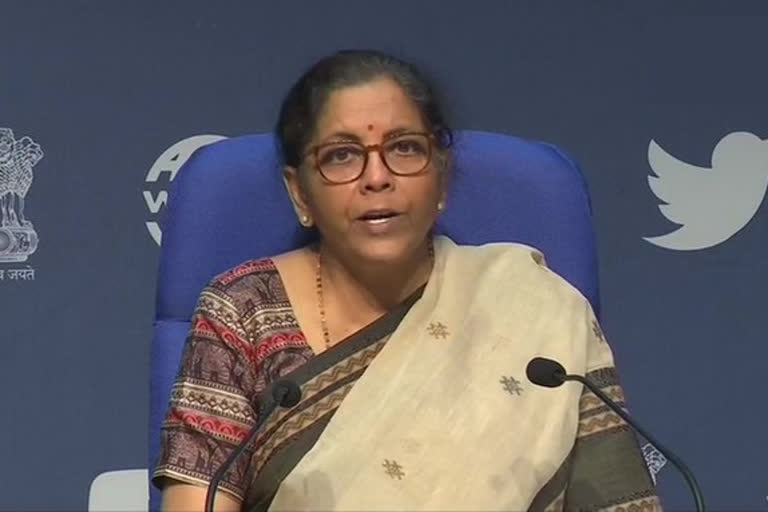New Delhi: As Finance Minister Nirmala Sitharaman on Saturday announced a slew of reform measures for defence and coal mining among others, political leaders and industry participants have come out applauding the government for the reform decisions, but many have also suggested that liquidity support is the need of the hour.
In a big-bang reform measure, the Centre decided to raise the limit for foreign direct investment (FDI) for defence manufacturing from 49 to 74 per cent under the automatic route. Further, the government has also allowed commercial mining of coal, whereby any party can bid for coal block and sell it in the open market.
Prime Minister Narendra Modi tweeted "Important sectors such as coal, minerals, defence, aviation, space and atomic energy have been covered in the announcements by the FM today. The measures and reforms announced will create many business opportunities and contribute to economic transformation.
-
Important sectors such as coal, minerals, defence, aviation, space and atomic energy have been covered in the announcements by the FM today. The measures and reforms announced will create many business opportunities and contribute to economic transformation.
— Narendra Modi (@narendramodi) May 16, 2020 " class="align-text-top noRightClick twitterSection" data="
">Important sectors such as coal, minerals, defence, aviation, space and atomic energy have been covered in the announcements by the FM today. The measures and reforms announced will create many business opportunities and contribute to economic transformation.
— Narendra Modi (@narendramodi) May 16, 2020Important sectors such as coal, minerals, defence, aviation, space and atomic energy have been covered in the announcements by the FM today. The measures and reforms announced will create many business opportunities and contribute to economic transformation.
— Narendra Modi (@narendramodi) May 16, 2020
Chandrajit Banerjee, Director General, Confederation of Indian Industry (CII) said said the announcements give shape to the Prime Minister's vision of 'Atmanirbhar Bharat' for localised manufacturing, reducing imports and boosting employment.
"We believe the policies announced today would incentivise India's global engagement with more fund inflows and higher competitiveness of domestic industry," he said.
Assocham Secretary General Deepak Sood said:
"Major policy decisions across the most critical and strategic sectors like defence production, space, atomic energy, civil aviation and commercial coal mining unveiled by Finance Minister Nirmala Sitharaman today demonstrate the government's resolve to stay on course of bold economic reforms, undaunted by the Covid-19 global health crisis."
Financial advisory firm FINDOC Group's Executive Director Nitin Shahi said that industry needs rationalisation of indirect taxes and customs duties.
"When we talk of structural reforms, these need to be deliverable on the ground. Industry needs rationalisation of indirect taxes, customs duties for a morale boosting capsule," he said.
Noting that the opening up of coal mining, raising the FDI limit for defence manufacturing sector are major steps, Shahi said that aviation, hospitality industries and other big industries need support in liquidity, tax reliefs to stay motivated.
D.K. Aggarwal, President, PHD Chamber of Commerce and Industry, said the structural reforms will give a big push to industrial and social development in the country and lead to a self-reliant New India with tremendous of new employment opportunities for technocrats, skilled, semi-skilled and unskilled workforce in India.
Read more:Finance Minister stresses upon 8 major sectors to make India self-reliant
The Union government has also decided to further relax the Indian airspace restrictions for civilian flying and auction more airports on a PPP basis, among other measures.
Noting that currently only 60 per cent the Indian airspace is freely available, Finance Minister Sitharaman said the move will bring a total benefit of about Rs 1,000 crore per year for the aviation sector.
However, Kuljit Singh, Transactions Partner, EY India, said:
"These are good initial first steps and this may be followed by a phase-two reforms package."
He noted that the second phase may need to have more reforms in taxes on fuel, subvention for airport charges, government guarantees for additional unsecured borrowings of private airlines among others.
"Further, in addition to the Indian government, the foreign aircraft lessors and foreign EXIM banks, may need to play a major role as well. Lastly, some of the private airlines may need to arrange for external equity capital, even at current depressed valuations, to tide over these unusual circumstances," Singh added.
Anurag Mathur, CEO of Savills India, was of the view that the real estate and allied industries will also stand to benefit from the proposed privatisation of six more airports through public-private partnership model.
Vasudevan S, Partner for Infrastructure Government and Healthcare at KPMG in India, said airport PPP transactions will help unlock value for Airports Authority of India (AAI) and state governments given current investor interest and long-term potential of the Indian market.
"Optimizing use of air space will certainly make airlines smile as it opens up the possibility to cutting fuel burn and improving turnarounds both on domestic and international routes, both likely to have a positive impact on their bottom-lines in a cash-guzzling business", he said.
Among the reforms for the power sector, Sitharaman announced to privatise the power distribution sector in Union Territories toset a model for adoption of similar reforms initiatives in states.
Sambitosh Mohapatra, Partner for Power and Utilities, PwC India said:
"Power distribution in UTs to be privatised is an exciting step ahead. These are smaller and manageable entities. It will assist in generating private sector appetite among Indian and international investors, various PPP models will be tested, and quick demonstration of possible efficiency improvement and customer engagement models".
It will provide confidence to larger states and utilities to undertake privatisation based on improvements achieved here, Mohapatra said.
(With IANS inputs)



